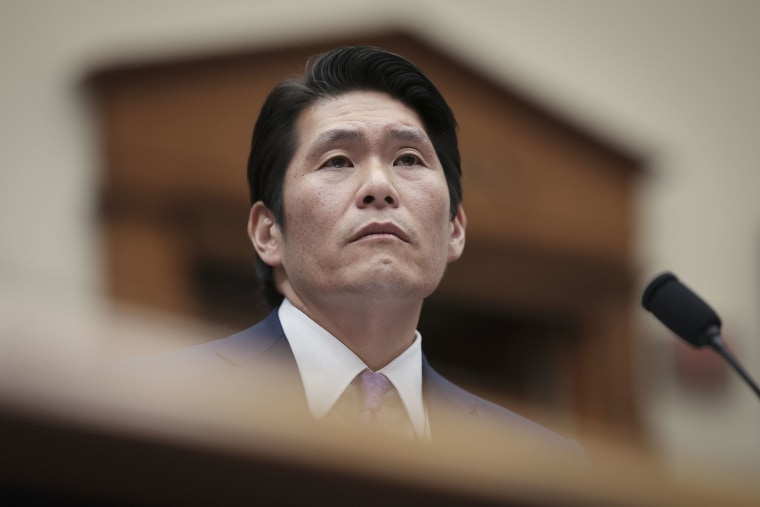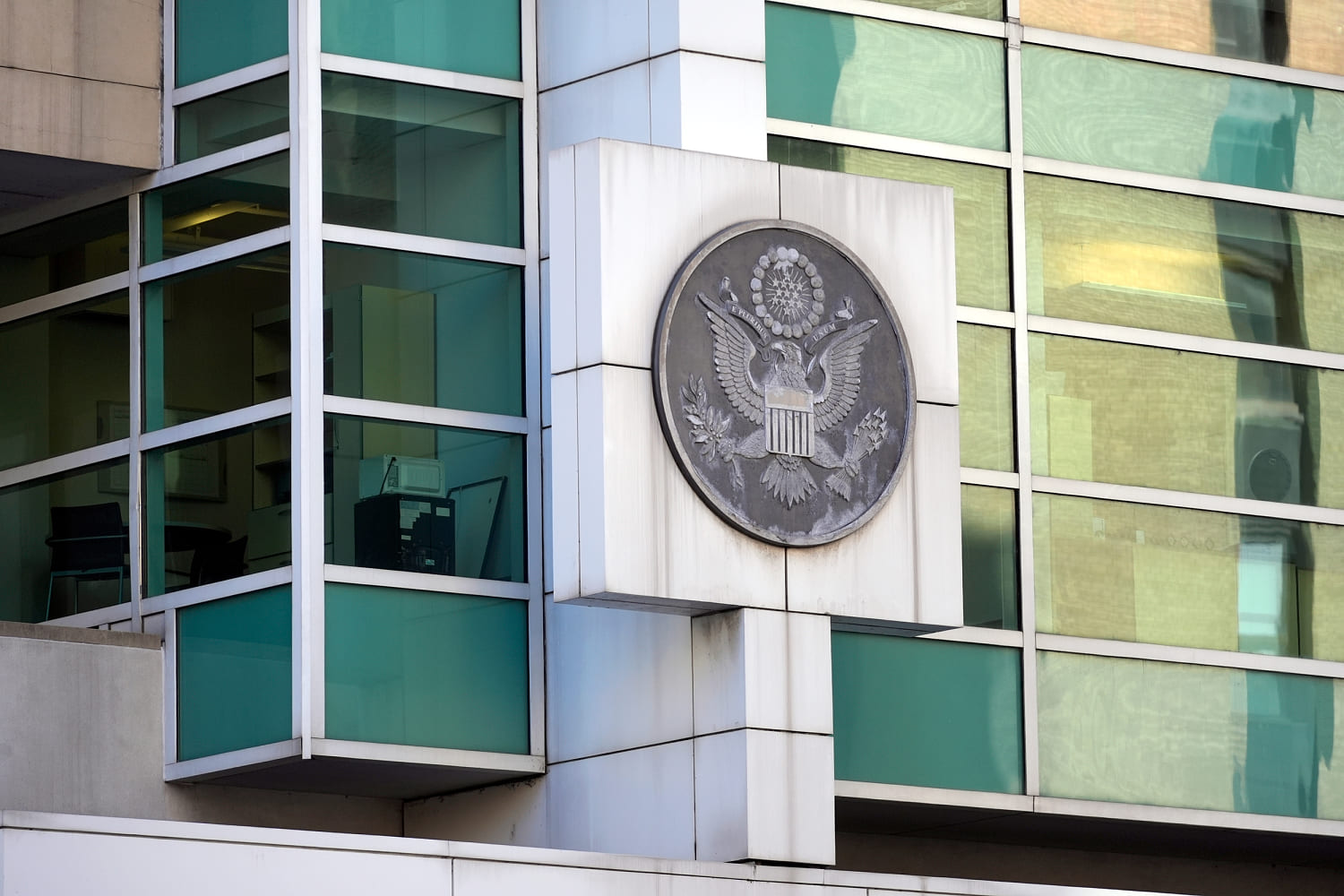Immigration and Customs Enforcement detained Denisse Parra Vargas’ three children — two of them American citizens and one born in Mexico — in Texas last week and, because authorities deported their mother, sent them out of the United States too.
The administration has responded to blowback from the children’s expulsions and those of other U.S. citizen minors, including a child with cancer and one recovering from a rare brain tumor, by saying the mothers were in the U.S. illegally and chose to take their children with them. The families and their attorneys vehemently disagree that the mothers had a choice.
Secretary of State Marco Rubio suggested in an interview April 27 on “Meet the Press” that the children’s situations are easily fixed.
“If those children are U.S. citizens,” he said, “they can come back into the United States if there’s their father or someone here who wants to assume them.”
While attorneys, advocates and researchers agree that U.S. citizens generally have the right to return, they said suggestions that the children can just easily come back to the U.S. gloss over the barriers and difficulties of what that would entail.
There are many hurdles that families would need to overcome for their U.S. citizen children to be able to return, according to Mich P. González, co-founder of Sanctuary of the South, an immigration and LGBTQ civil rights cooperative. His group and its member organizations has been assisting two families whose mothers were deported from Florida and their children, including three U.S. citizens, who were sent with them.
González said ICE often confiscates identification documents when deporting people. For example, the 2-year-old U.S. citizen daughter of the Honduran mother González represents had her passport taken away before she left, he said. That means the family would have to get the necessary paperwork from the U.S. to prove the child was born there.
In many cases, U.S. citizen children don’t have passports in the first place, which are required when returning to the U.S. from a foreign country by air. Children younger than 16 arriving from Canada or Mexico, if they don’t have passports, must have original birth certificates or other specific documents to return to the U.S.
“They don’t have passports, the two children only have their birth certificates,” said Naiara Leite Da Silva, the attorney representing Parra Vargas. “Not sure if mom has the original or a copy, but she only has the birth certificates, so it would entail a long and convoluted process before they could potentially come back.”
Finding an authorized guardian who is a U.S. citizen and can travel with the child can also be difficult, González said. Families would have to come up with the money to cover the costs of flying their children back to the U.S. or covering the cost of a guardian at a time when they may be financially strained, attorneys said.
One of the biggest complications right now, according to González, is any potential risk for the U.S.-based guardian to travel outside the country to go get the child. The administration has ratcheted up the power of border authorities to determine who should be admitted back into the country, even those with legal immigration status.
“You can risk being stranded outside the United States,” González said.
Activists and attorneys said that the nation’s focus should be on whether the children should have been expelled in the first place.
They argue that the parents may have had options for remaining in the U.S. had they been given a chance to consult with an attorney. In some of the recent cases, attorneys have pointed out that parents could have at least settled the question on whether their children should remain in the U.S. and with whom, before their deportation.
Leite Da Silva said the Parra Vargas’ family “strongly opposes the government narrative that it was the family’s choice to keep the children with them … they never had the choice of leaving their children in the United States.” Because of that, she refers to the children as “forced expatriates.”
She said Parra Vargas was “entrapped” because the family alleges they were told to come in for an asylum interview where they would get work authorization papers, and they were told to bring the children with them. According to the attorney, once they were at the appointment and were told they were to be deported, they weren’t allowed to communicate with family members who were in the Pflugerville processing center parking lot and who were legal residents and could have kept the children.
In response to questions from NBC News, Department of Homeland Security Assistant Secretary Tricia McLaughlin stated via email that if an immigrant in the country illegally is subject to detention, they “will almost assuredly be detained.” DHS had previously stated that Parra Vargas had a deportation order after she failed to appear at a 2019 immigration hearing.
McLaughlin repeated DHS’ previous statements that parents illegally in the country can “take control of their departure” and leave using an app created by the administration and that the administration is offering those who leave $1,000 and a free flight.
ICE adopted procedures during the Obama administration — Trump border czar Tom Homan was acting ICE director at the time — to give families time to decide what to do about their citizen children, said Sirine Shebaya, executive director of the National Immigration Project. She added that one of the mothers deported from Florida had said she didn’t want her U.S. citizen children to have to leave the country.
The parents’ decision to keep their child with them or send them back to the U.S. is not so easily reached.
Parents have to consider whether leaving them behind, sending their child back to the U.S. or even the act of traveling without their parent could further traumatize their child, González said.
One of the children sent out of the country when her mother was deported to Mexico is 11 and is recovering from a brain tumor.
“Think about yourself when you were 11. Now think if you had a brain tumor and think about whether you could get to another country without your parents. Would that be feasible for you? We should not be asking kids to do something like that,” said Rochelle Garza, chair of the U.S. Commission on Civil Rights and president of the Texas Civil Rights Project.
Advocates and attorneys are working to petition for humanitarian parole to get the family members who are not citizens back in the U.S. with the girl.
In general, people who have been deported are not allowed to return to the U.S. for a stretch of time from three years to 10 years, depending on how long they were in the U.S. without legal authorization.
Generally, parents are more willing to allow older U.S. citizen children, more so than younger children, to remain in the U.S., said Wendy Cervantes, director of immigration and immigrant families at the Center for Law and Social Policy, an anti-poverty group.
In some of those cases, older children become guardians to younger siblings.
“I’ve seen cases where families are broken up and the older kids stay here and they might stay with an uncle or an aunt and in some cases if they are close to being 18, they actually are the ones left to care for other children, to keep the house that maybe was purchased (by the parents) and they become these super young adult caregivers,” Cervantes said.
A look into the ‘de facto deported’
With younger children who are forced to live in their parents’ homeland either by U.S. government policy and their parents’ decisions, a return to the U.S. could be years away. And much can happen in those years.
U.S. citizen children who have been deported can face some immediate setbacks when they get to their parents’ home country, said Victor Zúñiga González, a professor of sociology at the Universidad Autónoma de Nuevo León, who has studied the migration of U.S.-born children to Mexico and Central America for nearly three decades.
In addition to adjusting to language and cultural issues, U.S.-born children could have their school enrollments delayed by lack of documentation to establish their legal Mexican citizenship, which is needed to attend school. Mexico grants citizenship to children born abroad to Mexican parents, but official certification is required, a process that Zúñiga said takes less time in the U.S. than in Mexico.
Parents can face similar issues in other countries, Cervantes said. In Guatemala, requirements for notarized school documents — a process that differs than in the U.S. — can delay school enrollment.
The population of U.S.-born children living in Mexico between 2000 and 2015 doubled, according to Erin Hamilton, a University of California Davis sociology professor.
In her study of U.S.-born children living in Mexico in 2014 and 2018, she found 1 in 6, or about 80,000 to 100,000, were there because one or both of their parents were deported, which she and her research colleagues termed “de facto deported.”
Hamilton found the “de facto deported” children were more likely to be economically disadvantaged than U.S.-born children who migrated to Mexico for other reasons. They also were less likely to be enrolled in primary school and 70% children had no health insurance, compared to 53% of the other U.S.-born children.
Garza, the civil rights commission chair, asked whether “we really want to have the conversation that it’s OK to remove certain U.S. citizens from the country … creating this fiction that they can come back if they want to.”



















